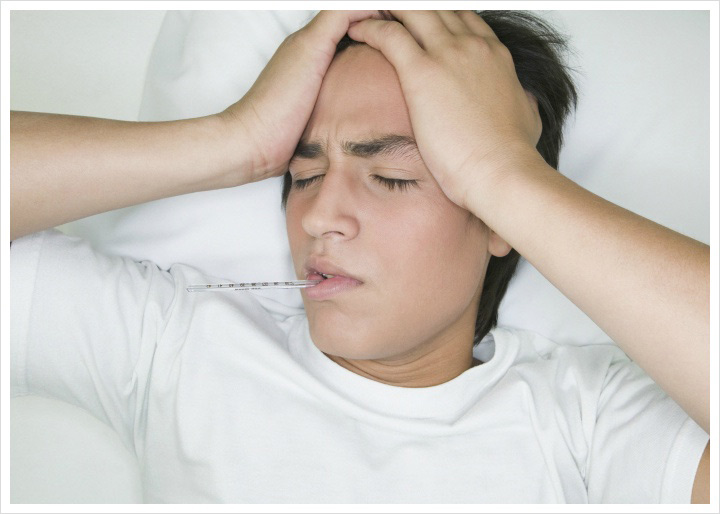What you need to know when your body has a fever
How to deal with high fever, headache
Fever is seemingly simple, almost everyone has a few times to take medicine to reduce fever themselves. However, things that seem right and we often do when we have a high fever are not beneficial for fever reduction.

Headaches with high fever may be a sign of meningitis. If the body feels that there is not enough water, add Acetaminophen or Ibuprofen to reduce fever.
Typically, body temperature is called fever when it reaches over 38 degrees C. Fever is usually the body's reaction to a disease caused by a virus or sometimes by bacteria. Thus the body's immune system begins to react to the intruder by releasing signaling substances to the brain to raise the body temperature higher than normal. This helps kill infections or many pathogenic microorganisms.
Fever often causes physical stress that is not considered dangerous, but hyperthermia causes an increased risk to the body.

Fever and headache are considered a deadly combination.(Photo: ojushealthcare)
Some signs and symptoms warn the body of fever
1. Cold chill
Cold chills are called cold sensations after exposure to a cold environment. This cold feeling may be accompanied by tremors. Cold chills often occur due to two things, one is accompanied by fever, the other is by exposure to the cold environment. Cold chills occur when the body produces heat when it feels cold. Cold exposure also leads to hypothermia (lower body temperature).
2. Headache
Fever and headache are considered a deadly combination, but one of the most common symptoms. However, headaches associated with high fever may be a sign of bacterial meningitis. It is a life-threatening disease that can affect the brain and spinal cord. In addition, while mild fever, there will be symptoms of eye pain and facial pain.
3. Seizures
In some cases, a seizure called seizure is triggered by high fever. This type of epilepsy is called fever seizure. This is quite dangerous and can be very scary to parents. It occurs when the fever rises suddenly. Some diseases that easily cause this situation include rubella, stomach infections and colds .
4. Dehydration

The higher the fever, the more water you lose.(Photo: infrastructurene)
The higher the fever, the more you lose water. Fever is also one of the factors causing dehydration. If your body feels uncomfortable and doesn't have enough water, try to supplement your body with Acetaminophen or Ibuprofen to reduce fever.
5. Sweating
Excessive sweating is a common symptom of fever. It usually happens when the body temperature changes.
6. Diarrhea
Diarrhea with loose stools and go more often than usual. It is the opposite case of constipation. People with fever often have abdominal pain.
7. Ho
Cough mainly develops a day or two after the fever. Symptoms of coughing are caused by high temperature (fever), headache .

8. Heart beating fast
Fast heartbeat is also a reaction of the body when fever. However, it is considered annoying and worrisome because many problems related to heart palpitations. Some of the causes of this symptom are anemia, low blood pressure, dehydration and high fever.
Treatment will vary depending on the causative agent. In case you have a high fever with the above symptoms, you should consult your doctor for timely intervention.
How does a fever need to be examined?
Dr. Luong Quoc Chinh recommends that cases for examination because of fever include:
- Children under 3 months old and have fever.
- Children aged 3-6 months with a fever of up to 38.9 degrees C with abnormal, indifferent or uncomfortable irritations.
- Children aged 3-6 months have a fever of 38.9 degrees Celsius
- Children aged 6-24 months have a fever over 38.9 degrees Celsius that lasts longer than a day but no other symptoms.
- Children aged 2-17 years have a fever of up to 38.9 degrees Celsius, abnormally irritable, indifferent and uncomfortable.
- Children aged 2-17 years with fever over 38.9 degrees Celsius lasting more than 3 days or not responding to treatment drugs.
- Adults have fever but do not respond to treatment, continuous fever 39.4 degrees Celsius or fever for 3 days continuously.
In particular, emergency medical care should be taken immediately if a child has a fever after being left in a hot car or the child has a fever without sweating, severe headache, convulsions, neck pain, confusion. For adults, any worrisome, unusual and unusual symptoms also need to go to an emergency.
- The reason for the conflict: High fever that the body feels shivering
- Fever - when do I need to go to the hospital?
- What is your fever?
- Fever Smart - Smart thermometer
- Mechanism of fever in humans
- How to identify children with dengue fever
- Reducing fever will slow recovery?
- Signs of distinguishing dengue and H1N1 flu
- Things to know when having a viral fever
- Chicken eggs should not be eaten when there is a fever
- How is dengue outbreaks raging?
- What should I do and how to eat and drink when I have dengue fever?
 Green tea cleans teeth better than mouthwash?
Green tea cleans teeth better than mouthwash? Death kiss: This is why you should not let anyone kiss your baby's lips
Death kiss: This is why you should not let anyone kiss your baby's lips What is salmonellosis?
What is salmonellosis? Caution should be exercised when using aloe vera through eating and drinking
Caution should be exercised when using aloe vera through eating and drinking